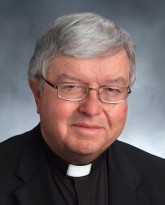By Father Kenneth Doyle | Catholic News Service
Q. Why is the Pope approving of civil unions for homosexuals? Isn’t this still one of the deadly sins? (Lexington, Indiana)
A. First, to clarify: I have never seen homosexuality mentioned as one of the seven deadly sins. In fact, many people with a homosexual orientation are celibate. The seven deadly sins are commonly listed as pride, greed, wrath, envy, lust, gluttony and sloth.

Now, to the matter of Pope Francis’ recent quote. A documentary entitled “Francesco,” released in Rome in October of 2020, quoted a comment the pope made in a 2019 interview with the Mexican network Televisa.
There, the pope said, “Homosexual people have a right to be in a family. They are children of God and have a right to a family. Nobody should be thrown out or be made miserable over it. What we have to create is a civil union law. That way they are legally covered.”
In saying this, Pope Francis was not changing the church’s moral teaching or its understanding of marriage. Marriage is an indissoluble union between one man and one woman, a union open to the transmission of life; as a result, gay marriage is unacceptable and Pope Francis has often affirmed that.
In the quote in question, he was speaking simply of the need to provide legal protection for the rights of nonmarried people living together in a stable way — rights, for example, involving inheritance, health care decisions and visitation when one is ill.
Q. I am a practicing Catholic, and my daughter is in the third grade at a Catholic school. In my former parish in Arizona, I used to have my hands raised in prayer during Mass. But now that I live in Michigan, we don’t do that, and it bothers my daughter when she sees my hands uplifted. Am I doing it right or wrong? (Michigan)
A. I am guessing that your question has to do with the posture of the congregation while reciting the Our Father. Not infrequently, I have seen individuals lift their hands during this prayer, and occasionally I have witnessed entire congregations do the same.
The U.S. Conference of Catholic Bishops has evidently been asked this question so often that, with regard to a congregational posture during the Lord’s Prayer, the bishops now say on their website, “No position is prescribed in the Roman Missal for an assembly gesture.”

I take that to mean that you are free to do as you wish — and praying with outstretched arms is, after all, one of the historic postures of prayer.
I am, of course, familiar with the distinction between private prayer and liturgical prayer, and I recognize that the General Instruction on the Roman Missal (No. 42) says that “a common bodily posture, to be observed by all those taking part, is a sign of the unity of the members of the Christian community gathered together for the sacred liturgy, for it expresses the intentions and spiritual attitude of the participants and also fosters them.”
But having your hands uplifted in prayer doesn’t seem to me to constitute a grievous violation of that canon of universality.
I think what you might do is just explain to your daughter that this is the way you’ve been trained, the way you feel comfortable praying and the way that helps you lift your mind and heart to God — which, after all, is what prayer is.






















